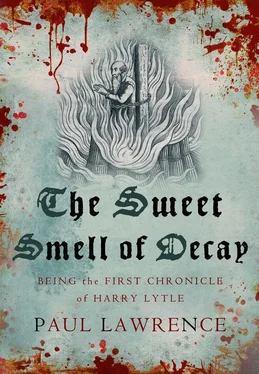Paul Lawrence - The Sweet Smell of Decay
Здесь есть возможность читать онлайн «Paul Lawrence - The Sweet Smell of Decay» весь текст электронной книги совершенно бесплатно (целиком полную версию без сокращений). В некоторых случаях можно слушать аудио, скачать через торрент в формате fb2 и присутствует краткое содержание. Год выпуска: 2014, ISBN: 2014, Издательство: Allison & Busby, Жанр: Исторический детектив, на английском языке. Описание произведения, (предисловие) а так же отзывы посетителей доступны на портале библиотеки ЛибКат.
- Название:The Sweet Smell of Decay
- Автор:
- Издательство:Allison & Busby
- Жанр:
- Год:2014
- ISBN:9780749015473
- Рейтинг книги:5 / 5. Голосов: 1
-
Избранное:Добавить в избранное
- Отзывы:
-
Ваша оценка:
- 100
- 1
- 2
- 3
- 4
- 5
The Sweet Smell of Decay: краткое содержание, описание и аннотация
Предлагаем к чтению аннотацию, описание, краткое содержание или предисловие (зависит от того, что написал сам автор книги «The Sweet Smell of Decay»). Если вы не нашли необходимую информацию о книге — напишите в комментариях, мы постараемся отыскать её.
The Sweet Smell of Decay — читать онлайн бесплатно полную книгу (весь текст) целиком
Ниже представлен текст книги, разбитый по страницам. Система сохранения места последней прочитанной страницы, позволяет с удобством читать онлайн бесплатно книгу «The Sweet Smell of Decay», без необходимости каждый раз заново искать на чём Вы остановились. Поставьте закладку, и сможете в любой момент перейти на страницу, на которой закончили чтение.
Интервал:
Закладка:
‘What then, Mr Hill?’
‘He left Epsom and returned to London in haste to find Keeling and confront him.’
‘How so, Mr Hill? If he disinterred the body of Jane Keeling then surely he must have been dissuaded from the foul notion he had heard from the lips of Elizabeth Johnson?’
Hill shrugged. ‘The body was ten years old. There is no telling what he thought he had found.’ Very neat.
‘So he flew to London?’
‘Aye, I think that someone at Keeling’s residence was unwise enough to inform him that Keeling was at the church of St Bride’s, praying for the soul of Anne Ormonde.’
‘God have mercy.’ The Attorney General put an arm across his chest and looked to the floor with his eyes closed.
‘The Lord preserveth the faithful,’ replied Hill, adopting the same pose. God have mercy indeed. On Hill’s worm-ridden, crumbly black soul.
‘What happened at the church?’
‘I arrived late,’ Hill shook his head mournfully. ‘I found them in the vestry. Just as I entered I witnessed the accused thrust a knife into Keeling’s heart. He died in my arms.’
‘In my house have I found their wickedness, saith the Lord,’ the Attorney General whispered.
And so fell the curtain on a wondrous performance. Of course the audience did not stand and applaud rapturously, they didn’t shout for more and refuse to cease until the players lined up before them to take a bow. But the effect was the same. The jurors began talking to each other, telling each other what wickedness lurked within the hearts of men, asking themselves if they could truly believe that one man could be capable of such sins, assuring each other that they had a God-given duty to make sure that these sins were punished in public, that the people should see what happens when man gives way to the demons that betimes may cling to his back. When Hill descended from the dock, helped by two clerks, the Attorney General stepped forward and put an arm around his shoulders and uttered sympathetic words. Me? I just sat there, a man condemned.
‘The jury will now retire to consider their verdict,’ announced the judge, in slow sombre tone. ‘They will consider that there are three possible verdicts.’
The jury ceased their pratings and listened to their instructions.
‘Acquittal is not a possible verdict, for the accused hath pleaded self-defence.’ The jurors nodded wisely.
‘To deliver a verdict of self-defence the jury must be of the opinion that Lord Keeling set about the accused with murderous intent. In this case it hath been established that the accused sought out Lord Keeling whilst of unsound mind and with the blood of Matthew Hewitt already on his hands. A verdict of self-defence would not be a wise verdict under such circumstance.’ The jurors all faithfully shook their heads.
‘A verdict of provocation doth imply that the accused was motivated to kill Lord Keeling because of the sins of Lord Keeling against his person. In this case there is no evidence that the Lord Chief Justice was guilty of any such actions.’ The jurors smiled as if the notion was absurd.
‘We are left with a verdict of guilty. The indictment was for the wicked murder of Lord Keeling.’ The judge looked up at the jury. ‘In this case, though it is not usual, I am willing that you consider the other crimes that this man may have committed, namely the murder of Matthew Hewitt and the desecration of the grave of Jane Keeling. You will retire until you are all of one mind, without food nor water.’
They trailed out in a line, following one another across the bench to a door at the back of the court. Some of them looked at me as they passed, others would not. What I saw in their faces left me without hope.
‘Up you get.’ One of my guards lifted me gently by the elbow. I was led back across the court in the opposite direction, out towards the holding cells.
To my pleasant surprise they didn’t put the manacles back on my wrists and ankles. No doubt they didn’t think it worth the effort given that mine would be a short wait. One of the guards stopped on his way out, turned swiftly, and put in my hand a piece of paper, surreptitiously. Then he was gone and the door was locked.
Everyone stood.
‘Harry Lytle. Thou art condemned for the murder of Thomas, Lord Keeling. Thou art condemned for the murder of Matthew Solomon Hewitt. Thou art condemned for the wrongful desecration of the grave of Jane Bridget Keeling.’
Not surprising.
‘Ye will be taken from Newgate prison, tomorrow, to Tyburn. At that place thee will be hung by the neck then cut down before thee have expired. Thine entrails will be drawn from your body and burnt before thee. Thy body will be cut into four pieces and thy head will be posted for all to see so that thy death shall be a warning unto others. May God have-’
‘Excuse me,’ I said very clearly, that all would hear. Then I read out the words on the piece of paper given to me by the guard. ‘I appeal to the King for a pardon.’
The judge looked at me as if I was mad and the Attorney General looked at me as if I was hiding some intelligent plan. Then the judge pulled a face as if to say, do as you will, and finished — ‘May God have mercy on thy soul.’
Chapter Twenty-Five
The colour of the flower is generally purple, less often a reddish colour.
The manacles went back on as soon as we stepped out of the courtroom and back we went to Newgate. In the coach I wondered who it was had written the note, and why? I knew that any man might ask the King for a pardon, but I had not thought to do so since there seemed so little remedy. It was clear to me now that whilst I had been an instrument of Shrewsbury’s, part of the grand scheme of things to clear Keeling from his path, that I was always to have been sacrificed at the end of it. I suppose that is why someone had persuaded my father to write a letter. I suppose that is why Hill had been appointed as my guardian — a face that I would trust — to act as a conduit that Shrewsbury might easily wipe his hands clean. I was another Richard Joyce, a little fellow that none would miss. I say this without any self-pity — for I have no desire to be a big fellow that all would miss. My partaking of this journey had reinforced my view that there was little good in the world, and that which did exist was pale, unformed and wriggling next to the doughty forces of the two selfs — self-preservation and self-advancement. So goodbye to Harry Lytle, I supposed. Yet the question remained — who had written me that note, and why?
At Newgate they led me not to the stone hold, but to a single cell on the ground floor. There was a barred window high up the wall casting a soft light onto a dry straw-covered floor. It was bare and almost clean. There was a table and on it was a plate of meat and a flagon of ale. This was something! Who had paid for that, besides?
Sitting at the table I ate and drank as best I could. It was not so difficult for I was getting used to the restrictions, and the sores on my wrists and ankles had begun to rub rough. So this was to be where I spent my last night? Unless my appeal was granted and I was to receive the King’s pardon. Would he not at least cast an eye over an affair that included the killing of his Chief Justice? But what if he did — the evidence had been so artfully caressed that to any man’s eye it would appear that I was guilty, surely? Unless Shrewsbury’s deviations were not yet fully unwound. Perhaps it was in his interest that I be condemned, yet then pardoned; that I might not be killed, yet still be restricted in the tales that I could tell. For had not the trial confirmed the official view of events and provided neat endings for all loose ends? If Shrewsbury had one ounce of a heart beating behind those bony ribs perhaps this was a way of expressing it. Perhaps it was a promise extracted by Hill in exchange for his damned testimony. I began to calculate the minutes and hours that it would take a man to ride to the King’s Palace and then back again to Newgate. It wasn’t a long journey. What did they do if the King was indisposed or not at the Palace? I didn’t know, though I harboured a fear that in such cases the execution was never stayed. These were the thoughts that trooped in circles about my mind as I lay there in lonely contemplation as the light of the day waned and reddened.
Читать дальшеИнтервал:
Закладка:
Похожие книги на «The Sweet Smell of Decay»
Представляем Вашему вниманию похожие книги на «The Sweet Smell of Decay» списком для выбора. Мы отобрали схожую по названию и смыслу литературу в надежде предоставить читателям больше вариантов отыскать новые, интересные, ещё непрочитанные произведения.
Обсуждение, отзывы о книге «The Sweet Smell of Decay» и просто собственные мнения читателей. Оставьте ваши комментарии, напишите, что Вы думаете о произведении, его смысле или главных героях. Укажите что конкретно понравилось, а что нет, и почему Вы так считаете.












